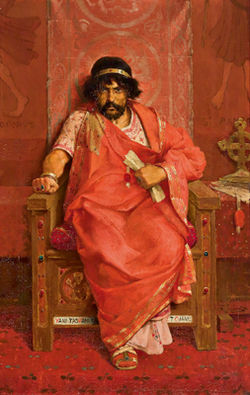- Matthew 2:3
-
Matthew 2:3 is the third verse of the second chapter of the Gospel of Matthew in the New Testament. In the previous verse the magi had informed King Herod that they had seen portents showing the birth of the King of the Jews. In this verse he reacts to this news.
In the King James Version of the Bible the text reads:
- When Herod the king had heard these things, he
- was troubled, and all Jerusalem with him.
The World English Bible translates the passage as:
- When King Herod heard it, he was troubled,
- and all Jerusalem with him.
For a collection of other versions see BibRef Matthew 2:3
That Herod should be troubled by the King of the Jews being born is not surprising. As an Edomite Herod was open to challenge from someone claiming to be the heir of King David, and the central theme of Matthew 1 is Jesus' Davidic status. Moreover Herod was renowned for his paranoia, killing several of his own sons who threatened him.[1]
Why all Jerusalem should be troubled is a more important question. Throughout this chapter Matthew shows the leaders of Jerusalem allied with Herod against the new messiah. These passages have been quoted in support of Christian anti-Semitism. That all Jerusalem is agitated also seems to conflict with later in the Gospel when the people are oblivious to Jesus. France suggests that the passage could perhaps be read as showing that the people of Jerusalem were troubled because of the possibility of Herod's wrath. Other scholars see this interpretation as being fairly implausible.[2] Brown notes that this phrase originates in Exodus. There is a theory that this part of Matthew is heavily influence by the story of Moses. In Exodus all Egypt is troubled by Moses, not just the Pharaoh. Thus in parallel all Jerusalem must also be troubled.[3] This view was shared by St. Chrysostom.[4]
Gundry sees this passage as influenced by the politics of the time it was written, a foreshadowing of the rejection of Jesus and his church by the leaders of Jerusalem.[5] Similarly Keener argues that Matthew is contrasting the goodness of the pagan Magi against the residents of Jerusalem as part of his overall advocacy of Christian outreach beyond the Jewish community. Matthew challenges his reader's negative views of outsiders by contrasting these foreigners with the bevahiour of those in Jerusalem.[6] Levin believes the verse reflects Matthew's social critique. She argues that throughout the Gospel he denigrates the wealthy and powerful city dwellers while elevating nomads like the magi and those who live in villages and rural areas.[7]
Gundry notes that this verse again makes sure to note Herod is a king. He sees this as an effort by the author of Matthew to create a deliberate contrast with Jesus, with Herod being the embodiment of all the things Jesus is not.[5]
References
- ^ France, R.T. The Gospel According to Matthew: an Introduction and Commentary. Leicester: Inter-Varsity, 1985. pg. 70
- ^ France, R.T. The Gospel According to Matthew: an Introduction and Commentary. Leicester: Inter-Varsity, 1985.
- ^ Brown, Raymond E. The Birth of the Messiah: A Commentary on the Infancy Narratives in Matthew and Luke. London: G. Chapman, 1977.
- ^ Chrysostom, John. Homilies on Matthew. Homily VI section 6. circa fourth century.
- ^ a b Gundry, Robert H. Matthew a Commentary on his Literary and Theological Art. Grand Rapids: William B. Eerdmans Publishing Company, 1982.
- ^ Craig S. Keener. A commentary on the Gospel of Matthew. Wm. B. Eerdmans Publishing, 1999. pg. 98
- ^ Levine, Amy-Jill. "Matthew." Women's Bible Commentary. Carol A. Newsom and Sharon H. Ringe, eds. Louisville: Westminster John Knox Press, 1998.
Gospel of Matthew Preceded by:
Matthew 2:2Chapter 2 Followed by:
Matthew 2:4Categories:- Gospel of Matthew verses
- Herod the Great
Wikimedia Foundation. 2010.

